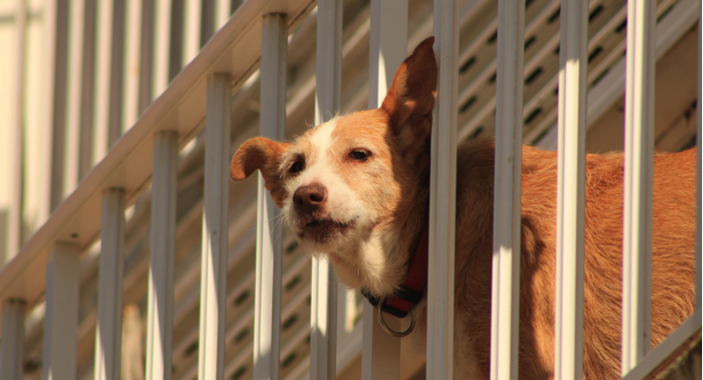The Condo-Canine Conundrum
Tips for home-buying dog owners looking to downgrade from a large estate to a maintenance-free lifestyle.
A strong housing market means limited availability, especially in commuter-convenient cities. When land is scarce, condos, townhomes, and multi-housing complexes become an appealing option for those looking to downsize. There are major differences between buying a single-family home and purchasing a condominium when you have canine counterparts barking up the family tree.
Careful consideration
Many planned unit housing structures simply don’t allow pets. And those that do often have restrictions against size, which makes it difficult for those of us with lab-sized lap dogs. The first question you must answer before considering the condominium is whether or not the building you like allows dogs in the first place. Once you have found accommodations that will accept your animals, double check the building’s anti-nuisance policy to help you determine if your furry friend can follow the rules.
Laws and liabilities
Avoid the temptation to move your dog into a condominium with anti-pet policies, no matter how much you love the layout. You may find yourself in the doghouse and potentially in the hole. The Chicago Tribune reports that the Condominium Act allows governing boards to levy fees and fines, which can be significant, against condo caretakers with covert canines. However, there are laws that protect homeowners with service animals pursuant to ADA guidelines. To qualify as a service animal, the dog must be certified to help with issues such as depression, seizures, and post-traumatic stress disorder.
Available amenities
Your dog needs more than just a place to sleep. One of the major drawbacks of condo life is a sudden inability to access adequate outdoor space. Before you commit, do a quick Google search for dog parks and other off-leash areas nearby. It’s also a good idea to pick a condo with a large outdoor balcony so that Spot can soak up the sun even if he can’t get to the grass. Be careful that your dog doesn’t decide to use your deck as an emergency bathroom or you can face complaints from your super-close-proximity neighbors.
Adjustment expectations
Living in a condominium is markedly different than living in a house, and not just for you. Your dog may have a lengthy adjustment period and it will be up to you to help him acclimate to his new (considerably confined) environment. You’ll need to make adjustments to your schedule to include extra exercise in the first few days and weeks. This is even more important for younger animals who agitate and excite easily. A sudden surge of sights and sounds can trigger unwanted behavior, even in the most docile dog, so you must be diligent in your training. Always correct inappropriate actions, such as barking every time someone walks by the front door, and reward positive behaviors. For more information on how to help your dog polish his manners when facing significant change in his living situation, click here.
Tips for transition
- Allow your dog to visit his new home at least a few days before settling in.
- Bring beloved items with you – it’s easy to want to buy a new, ostensibly less odorous, bed but he will need familiar smells to feel more at home.
- If Fido isn’t well socialized, work on his community connections by walking him daily in areas where other dogs are likely to be.
- Introduce new activities, but slowly.
- Don’t change your routine abruptly -- with the exception of additional exercise time for Tank.
Leave no trace
As best you can, leave no trace of your pet prior to putting your own house on the market. By decluttering, eliminating odors, and removing pet dishes, you will leave a great impression for all potential buyers who step foot in your home. Learn more tips on properly staging your home here.
Obviously, your dog can’t make decisions for himself. If he could, he would likely choose to remain in the same home until death do them part. However, moving is an almost unavoidable event, at least at some point in your dog’s life. In time, your pup will feel right at home, and so will you, no matter which type of mortgage makes its way into your life.
Article provided by Medina at DogEtiquette.info



![Why Hire a Professional Real Estate Agent? [Video]](https://calebpearsonteam.com/wp-content/uploads/2017/07/Caleb_Pearson_-_July_2017_-_1_YouTube-150x150.jpg)
